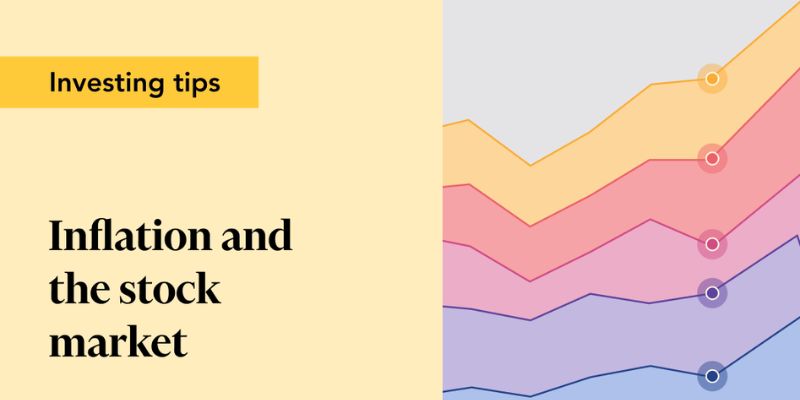How Rising Inflation Sways Your Stock Portfolio’s Fortunes
Ever wondered how rising inflation affects stock prices? You’re not alone. Picture your stock portfolio as a ship. Smooth sailing hinges on calm seas. But let inflation rise, and waves can toss your investments around. Just like a seasoned captain, you need to know how these economic tides work. They can help or hurt the value of the stocks you own. In this guide, I break down the inflation-stocks puzzle. I’ll show you how to steer your portfolio to safer waters when inflation rages.
Unpacking Inflation: How It Hits Your Stocks
Understanding Inflation’s Ripple Effect on Equities
Let’s chat about inflation. It’s like a slow-motion wave. When it hits high, you feel it in your wallet. So, how does it sway the stocks you own? The truth is, inflation impact on equities can be huge. Imagine prices for stuff go up. Then, companies may pay more to make what they sell. This can pinch their cash. If their costs rise faster than what they charge, they make less money. When firms earn less, investors might get cool on their stocks. That means stock prices can dip.
Costs aren’t the only worry. Inflation can make life tough for all. When folks spend more on food and gas, they might not buy as much other stuff. Less shopping means firms might sell less. Then, think about this – money is worth less when prices climb. Your cash buys less, and that’s not fun.
Now, you ask, how does inflation rate effect on stocks really work? It’s because of how much a buck can buy. When prices jump, a dollar today buys less than yesterday. Same goes for stocks. If you made $100 on stocks, but bread and milk cost way more, your win’s not that big. You feel less rich – that’s called lower inflation-adjusted return on stocks.
Then, there’s the Fed, all part of central bank policies impact on stocks. They can hike up interest rates to cool off prices. But higher rates can mean companies pay more to borrow money. Interest rates and equity prices are like a seesaw. When one goes up, the other often falls.
The Interplay Between Consumer Price Index and Stock Values
Think of the Consumer Price Index, or CPI, as a giant shopping list. This list shows how prices change for everyday things. When CPI jumps, it tells you inflation’s up. But wait, how is the consumer price index relation to stocks?
When CPI climbs, it can scare folks in the stock market. They might worry that their money won’t stretch as far. Or they think companies’ costs are sky-high. All this fretting can send stock prices on a bumpy ride.
Now, inflationary pressures on investments can be a downer. But not all stocks feel the heat the same way. Some may hold strong even when inflation brings the heat. Knowing these protective sectors against inflation can be key.
So, what’s your take-home from all this? When inflation’s up, stocks can act out. Prices for things you buy and sell each day shake up the game. It’s all about how much cash companies shell out and what they haul in. That’s the big deal with inflation vs. stock performance.
Always keep an eye on the big picture, like CPI and the Fed. They tell you lots about inflationary trends and market volatility. If you get this, you’ll make smarter moves with your stocks. Remember, knowing how rising inflation sways your stock portfolio’s fortunes helps you stay afloat, even when financial waves come crashing.

Market Mechanics: Steering Through Inflationary Waves
Reacting to Central Bank Monetary Policies
When prices rise, the money in our pockets buys less. That’s inflation at work. It makes things pricier. Like when your favorite ice cream goes from one dollar to two. Central banks, like the Federal Reserve, try to slow it down. They boost rates to make borrowing pricier. This can cool off spending and inflation.
But higher rates also impact stocks. Companies pay more to borrow money. Their profits can take a hit. When profits dip, so can stock prices. Let’s say a company like Apple has to pay more for loans. It could hurt their earnings. If they earn less, people might not want to hold their stocks. This could drive Apple’s stock price down.
Sector Analysis: Identifying Inflation-Resistant Stocks
Inflation doesn’t hit all stocks the same way. Some can stand up to it better than others. We call these inflation-resistant stocks. They’re in sectors that don’t feel the heat as much when costs go up. Think of things people always need, like food, energy, and healthcare.
Food companies, like General Mills, make stuff we buy no matter the cost. Energy firms, like Exxon, sell fuel. Even with higher prices, we still need to drive and keep our homes warm. Healthcare is a must. Providers like UnitedHealth keep doing well because people need care, high prices or not.
But remember, big inflation can still cause trouble. When it gets really high, like in hyperinflation, all bets are off. Even these sturdy stocks can wobble. It’s rare, but it does happen.
Finding these tough sectors is key. They help your stock stash stay strong when inflation hits. You can look to things like gold, too. Many see it as a safe place when money’s value dives.
So, you see, inflation sways your stock choices a lot. If you know where to look, you can spot the firms that might just weather the storm. They might not grow fast. But they’ll likely give your portfolio a fighting chance against inflation’s punch.

Strategic Stock Portfolio Adjustments in High Inflation
Balancing Long-Term vs Short-Term Equity Positions
High inflation can sway your stock choices. Got a gut feeling to sell all stocks and hide your cash? Hold that thought. It’s about balance. Long-term and short-term picks play unique roles. Think of long-term picks as your anchor. They weather the storm. On the other hand, short-term positions can act fast. They snatch profit in rough seas.
Now, picture inflation as a sneaky thief. It nibbles away at your cash. Stocks, however? Well-chosen ones can punch back. They defend against inflation’s stealthy reach. So, owning both types lets you stand strong. Even when inflation rears its head.
We face a twisty question: What makes a good balance? Let’s dig deeper. For long-term success, pick firms with substance. Hunt for those that sell things folks always want. They face inflation head-on and hold their ground.
“But what about right now?” you wonder aloud. “How do I make gains in this wild market?” Let me answer straight up: Look for growth and speed. Quick movers spot trends and lock in prices. They can fend off inflation’s bite, even in short bursts.
Inflation Hedging: Equities That Shield Your Wealth
Inflation hedging? It’s like your financial armor. It keeps your wealth safe when prices soar. High inflation days can turn stock picking into a battleground. Your mission: shield that hard-earned cash. Not with a broadsword, but with savvy picks.
Sectors shine here. Some stand tall as inflation climbs. Take a look at health care and consumer staples. These are solid rocks when waves crash. Why? We need them, rain or shine. Their prices stick, and that’s good for your stocks.
Think about raw stuff like oil and metals too. Their worth often jumps up with inflation. Companies dealing in these are like knights in this fight. They help defend your portfolio’s kingdom from harm.
Folks often forget bonds. Yet, they’re part of this tale too. Inflation-protected ones adjust with rising costs. They keep their value, offering a quiet guard for your treasure.
“But hey, what about gold?” someone shouts from the back. Good point, keen-eyed investor. Gold glitters in this mess for sure. It’s the classic shield against inflation’s punches. Still, it’s not all golden sunshine. Gold doesn’t dole out dividends like stocks can.
In the end, it comes down to balance. Pair short moves with long holds. Blend sectors. Mix in some inflation-steady bonds. And yes, maybe even a sprinkle of gold. That’s how you hedge and keep your stock portfolio standing tall. Even as the inflation dragons spit fire.

Navigating Future Uncertainties: Inflation and Market Predictions
Impact Analysis: Interest Rates on the Horizon for Stocks
When inflation goes up, your stocks can feel it. You ask, “How?” Let me tell you. Stocks and inflation are like seesaws. When one goes up, the other might go down. Now, interest rates and equity prices mostly don’t mix well. Think of interest rates as the cost to borrow money.
So when rates climb, borrowing gets pricey. Companies may slow their growth, and that can hurt stock prices. High interest rates can also sway people to bonds which offer fixed returns. When that happens, fewer folks buy stocks. This can cause stock prices to dip.
But why do rates climb with inflation? The central bank raises rates to cool down the economy. It’s like taking a breather when running. This is so prices don’t shoot up too high, too fast. The Federal Reserve and the stock market are in a dance. When the Fed moves, the market reacts.
Higher rates aim to slow inflation. But they also mean higher costs for companies. These costs can eat into profits. Lower profits can lead to lower stock prices.
Enhancing Purchasing Power Through Informed Stock Selection
You’ve worked hard for your money. You don’t want inflation to eat it up. Picking the right stocks can help. Some sectors stand strong even when inflation hits. You want these in your corner. Think essentials – folks always need healthcare and food.
You can also look at asset prices during high inflation. Real assets like property can do well. They often keep their value as prices go up. Stocks in these areas can be a safe bet.
What about an inflation hedge with stocks? Some stocks fight inflation well. They keep or grow their value. Gold used to be popular for this. Yet, some say stocks can be the new gold in this game. Tech stocks might dip first. But they have strong growth often. This growth can beat inflation over time.
Inflation troubles can also change stock choices. You might want to shift away from high-debt companies. Their loans cost more as rates go up. Instead, eye those with strong cash flow. They can handle the heat better.
Rising prices mean your dollars buy less. You want stocks that can grow enough to beat this. This helps your purchasing power stay strong. You win by staying ahead of inflation.
So be smart with stock selection during inflation. It can keep your investments from shrinking. Pick those with a good stance against rising costs. Then you can sleep well, knowing your stocks are working hard. They can protect and grow your wealth, even against inflation’s push.
In this post, we dived into how inflation messes with your stocks. We explored how rising prices ripple through equities and the link between the consumer price index and stock values. We then moved on to decode the market’s moves when inflation strikes, highlighting how central bank policies shape stock performance and which sectors stand tough during these times.
We talked strategy, too, focusing on adjusting your stock portfolio for inflation. Keeping the right mix of long and short-term stocks is key, as is picking equities that guard your cash. Lastly, we peered into the future, weighing how interest rates could shake up the market and how smart stock picks boost your buying power.
Thinking about stocks and inflation can be tricky, but with these insights, you’ve got a solid plan. Keep your eyes on these factors to make sure inflation doesn’t sink your investments. Stay informed, stay flexible, and pick wisely. Your wallet will thank you.
Q&A :
How does inflation impact the stock market?
Inflation can have a variety of effects on stock prices. Generally, as inflation rises, the purchasing power of consumers decreases, which can lead to lower company earnings and, consequently, lower stock prices. Additionally, to counteract inflation, central banks may increase interest rates, making borrowing more expensive for companies, potentially slowing down growth and investment, and making bonds more attractive compared to stocks.
Can rising inflation lead to a stock market crash?
While rising inflation alone is not typically enough to cause a stock market crash, it can be a contributing factor. High inflation can lead to increased interest rates and decreased consumer spending, which in turn can negatively impact company profits and investor confidence, potentially leading to a market downturn. However, market crashes are often the result of a combination of complex factors.
What types of stocks are most vulnerable to inflation?
Typically, high-growth stocks and stocks with high valuations relative to their earnings are more vulnerable to rising inflation. These types of stocks rely heavily on future earnings for their valuation, and inflation can erode the value of these future earnings. Conversely, stocks in sectors like energy, commodities, or financials may be less susceptible or can sometimes even benefit from mild inflation.
How should investors adjust their portfolios during high inflation periods?
During periods of high inflation, investors may consider adjusting their portfolios to include assets that historically perform well during such times. These can include stocks in sectors like commodities, energy, and financials, which can benefit from rising prices. Additionally, assets like Treasury Inflation-Protected Securities (TIPS), real estate, and precious metals can offer some protection against inflation. It’s also advisable to review the balance between stocks and bonds, as well as seek the guidance of a financial advisor.
Does inflation always hurt stock prices?
Not necessarily. Moderate inflation is often a sign of a growing economy and can lead to increasing stock prices as long as company earnings keep pace with or outstrip inflation. However, when inflation becomes too high and is not accompanied by commensurate earnings growth, it can erode purchasing power and investor returns, leading to a decline in stock prices. The impact of inflation on stocks also depends on how well companies can pass on increased costs to consumers.

